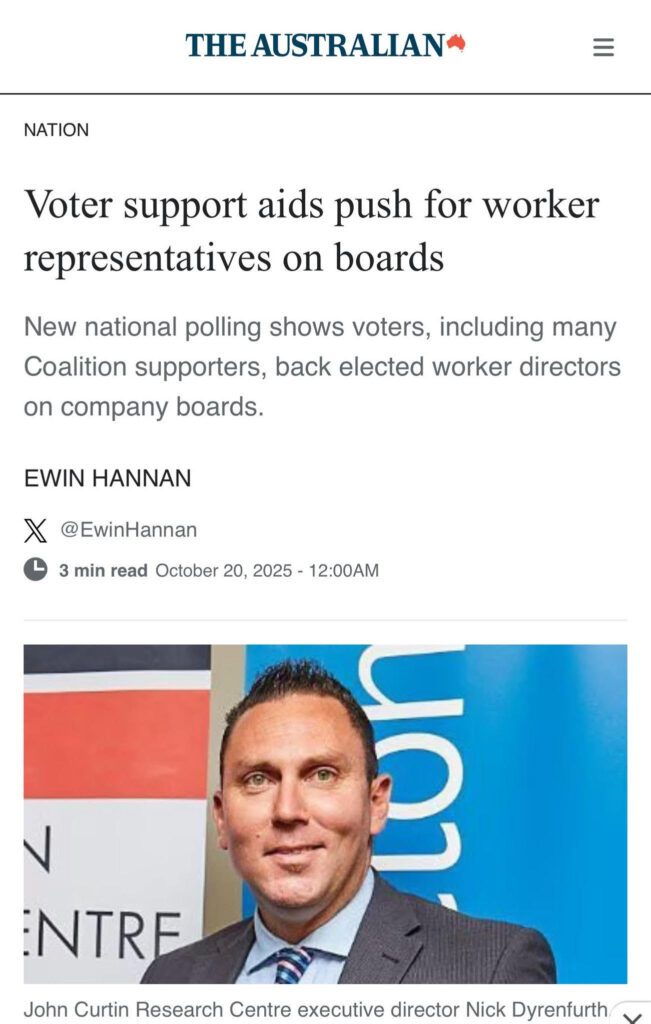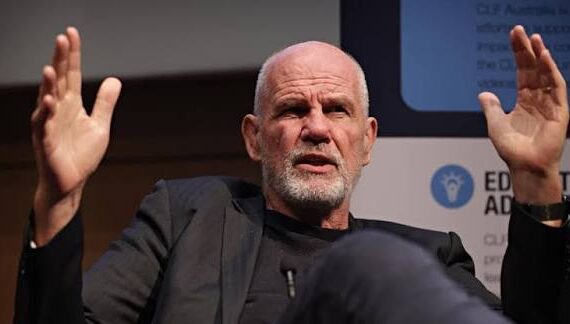
Nick Dyrenfurth
Executive Director of the John Curtin Research Centre

Image credit: Bloomberg
Australian voters, including a significant share of Coalition supporters, back having elected worker directors on company boards, according to new national polling which will boost the longstanding push by unions for the Albanese government to back the proposal.
Polling commissioned by the John Curtin Research Centre found majority support for electing worker representatives to the boards of large publicly listed companies, such as banks and supermarkets, as well as government-owned corporations like Australia Post.
Appointing worker representatives to boards was backed by the ALP national conference in 2023, and unions welcomed the polling results which are likely to be used to press the federal government to take action.
JCRC executive director Nick Dyrenfurth said the poll, conducted by RedBridge Group, showed “no groundswell of opposition, only broad agreement that our economy needs a new social contract with workers as partners in growth, not just costs on a spreadsheet”. “Codetermination has the potential to be the one big bang, pro-worker and pro-business reform the Albanese Labor government will be remembered for,” Dr Dyrenfurth said.
The survey of 1050 voters found 51 per cent backed electing worker representatives to the boards of government-owned corporations, with only 15 per cent opposed, while 53 per cent supported large publicly listed companies being required to have at least one elected worker-director, with just 18 per cent against the idea.
The proposals had support spanning party lines and demographics, including 40 per cent of the Coalition voters who took part in the survey.
Dr Dyrenfurth said the findings were consistent with the ALP’s 2023 national platform which affirmed that “Labor will work with unions and business to support greater industry and workplace collaboration. Labor will work towards the implementation of an ‘Australian model’ of company and relevant board representation for workers”.
The platform also says “Labor will ensure that relevant government advisory and governance boards are tripartite, and in particular provide for trade union representation”.
Dr Dyrenfurth said the message from the polling was unmistakeable.
“Australians want workers to have a seat at the table where the biggest corporate decisions are made with regards to issues which affect them in the age of AI,” he said.
“It’s time to bring Australian boardrooms into the 21st century. Giving employees an elected voice is not only fair, but it’s a proven driver of productivity. International evidence shows worker representation lifts collaboration, innovation and long-term performance.
“Our own research demonstrates that Australia’s productivity slowdown will not be solved by old ideas of wage suppression or cost-cutting. Real productivity gains come from engaged workforces and shared decision-making. Worker directors are a practical, zero-cost to the budget long-term reform that would help unlock that potential and empower Australians.”
ACTU assistant secretary Joseph Mitchell said unions supported more worker representation in corporate boardrooms and worker-management consultative committees “because it leads to better outcomes for the workplace”.
“As we’ve seen with industry super funds, when you have workers represented by unions and employers sitting at the same table, that combined experience leads to more informed decision-making to drive a fairer share of high-quality, high-wage jobs for workers in the future,” Mr Mitchell said.
Australian Workers’ Union national secretary Paul Farrow said “if you run a big complex organisation, it should be a no-brainer to give the people who do the actual work a seat at the table if you want to innovate and survive”.
“Countries that put workers on boards – Germany, Switzerland, Japan – dominate the global competitiveness rankings. That’s not a coincidence,” Mr Farrow said.
“Giving workers a seat at the board table would be a great antidote to comfortable corporate groupthink. Half the corporate scandals we’ve seen fester in recent years I reckon a workers’ rep in the boardroom would have seen coming from a mile away.
“Right now, big business is loathed by the majority of Australians. That’s toxic and it doesn’t have to be that way. But you can’t just pay lip service about changing – you have to show that you’re different. People aren’t stupid and they know the difference.”
By: Nick Dyrenfurth
By: Nick Dyrenfurth
By: Nick Dyrenfurth








